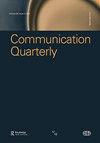Lie judgment trigger sensitivity and truth-bias: truth default theory in intergroup communication
IF 1
Q2 COMMUNICATION
引用次数: 2
Abstract
ABSTRACT The central premise of truth-default theory (TDT) posits that listeners are truth-biased in communication exchanges. Levine’s TDT speculates that intergroup communication impacts truth-bias. To test this notion, participants judged the veracity of videos of speakers from the U.S. and China discussing their opinions on mask mandates and personal relationships. The results show that people hold a stronger truth-bias toward in-group members when those people share the same stance on the social issue of mask mandates. However, the study findings did not show a relationship between cultural identity on truth-bias. Interestingly, all participants showed a higher lie judgment trigger sensitivity toward speakers from a different culture, and higher lie judgment trigger sensitivity was also present for those who shared differing opinions on mask mandates.谎言判断触发敏感性与真相偏见:群体间沟通中的真相默认理论
真理默认理论(TDT)的中心前提是:在交际中,听者存在真理偏见。莱文的TDT理论推测,群体间的沟通会影响真相偏见。为了验证这一观点,参与者判断了来自美国和中国的发言者讨论他们对口罩要求和个人关系的看法的视频的真实性。结果表明,当人们对面具要求的社会问题持相同立场时,人们对群体内成员的真相偏见更强。然而,研究结果并没有显示出文化认同与真相偏见之间的关系。有趣的是,所有的参与者都对来自不同文化背景的说话者表现出更高的谎言判断触发敏感性,而对面具要求持不同意见的人也表现出更高的谎言判断触发敏感性。
本文章由计算机程序翻译,如有差异,请以英文原文为准。
求助全文
约1分钟内获得全文
求助全文

 求助内容:
求助内容: 应助结果提醒方式:
应助结果提醒方式:


